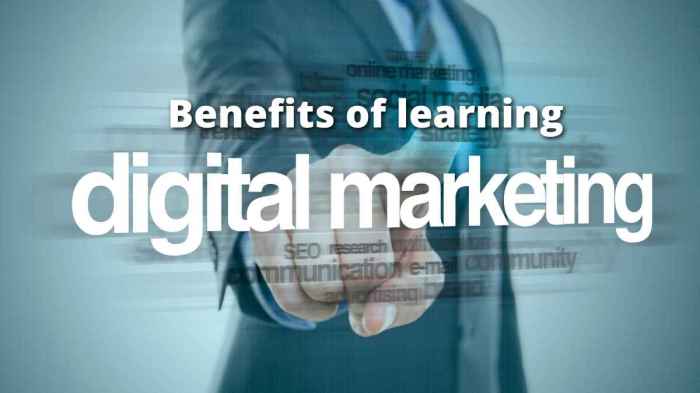The importance of ongoing learning and development in digital marketing sets the stage for success in this rapidly evolving field. The digital landscape is a dynamic environment, constantly shifting with new technologies, platforms, and consumer behaviors. Mastering digital marketing requires a commitment to continuous growth, embracing new skills and strategies to stay ahead of the curve and remain competitive.
This journey of lifelong learning isn’t just about keeping up; it’s about thriving and innovating in a world where adaptation is key to achieving remarkable results.
This exploration delves into the essential skills needed for thriving in digital marketing, examining the most in-demand proficiencies and offering practical guidance on how to acquire them. We’ll explore diverse learning methods, from online courses and workshops to industry conferences and self-directed study, highlighting the benefits of each approach and offering strategies to build a personalized learning plan tailored to individual career goals.
Ultimately, we will show how continuous learning directly translates into a more fulfilling and successful career in digital marketing.
The Evolving Landscape of Digital Marketing

The digital marketing world is a dynamic and ever-changing landscape. What worked yesterday might be obsolete tomorrow, demanding constant adaptation and a commitment to lifelong learning. This relentless evolution necessitates a proactive approach to skill development, ensuring marketers remain relevant and effective in their roles.The rapid pace of change in digital marketing significantly impacts the skill requirements for professionals in this field.
New platforms, algorithms, and technologies emerge constantly, requiring marketers to acquire new expertise and adapt their strategies accordingly. This necessitates a continuous learning process to remain competitive and achieve optimal campaign results.
Technological Advancements Driving Ongoing Learning
The digital marketing field is driven by continuous technological innovation. Artificial intelligence (AI), machine learning (ML), automation tools, and advancements in data analytics are reshaping how marketers plan, execute, and measure campaigns. For example, the rise of AI-powered chatbots has revolutionized customer service interactions, requiring marketers to understand how to integrate and leverage these technologies effectively. Similarly, the increasing sophistication of programmatic advertising demands expertise in data-driven targeting and optimization.
Failing to adapt to these advancements can lead to missed opportunities and ineffective campaigns.
Impact of Failing to Adapt to Change
A failure to adapt to the evolving digital marketing landscape can severely hamper a marketing campaign’s performance. For example, a reliance on outdated techniques can lead to lower search engine rankings and reduced organic traffic. Ignoring the potential of new social media platforms can limit reach and engagement with target audiences. Similarly, a lack of understanding of data analytics can hinder the ability to measure campaign effectiveness and make data-driven decisions.
Remember to click building a sustainable and scalable digital marketing business model to understand more comprehensive aspects of the building a sustainable and scalable digital marketing business model topic.
In essence, stagnation in learning can directly translate to lost opportunities and reduced ROI.
Investigate the pros of accepting how to handle difficult clients in a digital marketing agency in your business strategies.
Traditional vs. Modern Digital Marketing Skills
| Traditional Marketing Skills | Modern Digital Marketing Skills |
|---|---|
| Print Advertising Design | Search Engine Optimization () |
| Direct Mail Marketing | Pay-Per-Click (PPC) Advertising |
| Market Research via Surveys and Focus Groups | Social Media Marketing & Management |
| Broadcast Advertising (TV, Radio) | Content Marketing & Strategy |
| Print Brochure Design | Data Analytics & Interpretation |
| Public Relations & Press Releases | Email Marketing & Automation |
| Sales Presentations | A/B Testing & Conversion Rate Optimization |
| Traditional Market Research Analysis | Artificial Intelligence (AI) in Marketing |
Measuring the ROI of Continuous Learning

Investing in continuous learning in digital marketing isn’t just a cost; it’s a strategic investment that yields significant returns. By tracking the impact of training and development, you can build a compelling case for ongoing professional growth, both for yourself and your employer. This involves not only measuring individual performance improvements but also demonstrating the broader organizational benefits, leading to tangible rewards like increased salary and career advancement.Tracking the impact of ongoing learning on individual performance requires a multifaceted approach.
It’s not enough to simply attend workshops; you need to demonstrate how the new knowledge and skills are applied and result in improved outcomes.
Tracking Individual Performance Improvements
Demonstrating the value of training to employers requires a clear and concise presentation of results. This goes beyond simply stating that you attended a course; it involves showcasing how the acquired skills directly improved your performance and contributed to the company’s bottom line. This can be achieved through concrete metrics and tangible examples.
Demonstrating Value to Employers
To effectively demonstrate the value of training and development to employers, quantifiable results are crucial. This involves meticulously tracking key performance indicators (KPIs) before, during, and after training interventions. For example, if a training program focused on improving skills, the impact can be measured by tracking changes in organic search rankings, website traffic, and lead generation. Similarly, training in paid advertising can be measured by improvements in click-through rates, conversion rates, and return on ad spend (ROAS).
Presenting this data in a clear and concise manner, such as through charts and graphs, will significantly strengthen your case.
Correlation Between Continuous Learning and Career Advancement
Continuous learning directly correlates with increased salary and promotion opportunities. Employers value employees who are proactive in enhancing their skills and staying current with industry trends. By demonstrating a commitment to professional development, you position yourself as a valuable asset, ready to take on greater responsibilities and contribute to the organization’s success. This commitment is often reflected in performance reviews and salary negotiations.
Employees who consistently invest in their skills are more likely to receive promotions and salary increases, as they demonstrate a willingness to adapt and contribute to the company’s growth.
Examples of Quantifiable Results from Professional Development
- Increased Conversion Rates: After completing a course on conversion rate optimization (CRO), a marketer improved their website’s conversion rate by 15%, resulting in a significant increase in sales leads.
- Improved Rankings: Following a training program on search engine optimization (), an employee improved the company’s website ranking for key s, leading to a 20% increase in organic traffic.
- Reduced Customer Acquisition Cost (CAC): Through training in paid advertising strategies, a digital marketer reduced the company’s CAC by 10%, leading to significant cost savings and increased profitability.
- Higher Customer Satisfaction Scores: A team member’s participation in customer service training resulted in a 10% increase in customer satisfaction scores, improving brand reputation and loyalty.
- Successful New Product Launch: A marketing team’s training in digital marketing strategy facilitated the successful launch of a new product, exceeding initial sales targets by 25%.
Building a Personalized Learning Plan: The Importance Of Ongoing Learning And Development In Digital Marketing

Embarking on a journey of continuous learning in digital marketing requires a strategic approach. A personalized learning plan acts as your roadmap, guiding you efficiently towards your professional goals and ensuring you stay ahead in this rapidly evolving field. It’s not just about accumulating knowledge; it’s about targeted skill development aligned with your specific career aspirations.A well-structured learning plan ensures focused effort, maximizing your time and resources.
It allows you to track your progress, celebrate achievements, and adapt your strategy as needed, fostering a sense of accomplishment and continuous improvement. This proactive approach transforms learning from a daunting task into an exciting and rewarding personal development project.
Creating a Personalized Learning Plan: A Step-by-Step Guide, The importance of ongoing learning and development in digital marketing
Crafting a personalized learning plan involves a structured process. First, identify your specific area of focus within digital marketing (e.g., , social media marketing, content marketing, email marketing, PPC). Next, define your short-term and long-term career goals. What skills do you need to acquire to reach these goals? Finally, research available resources – online courses, workshops, books, industry blogs, and networking opportunities – and integrate them into a schedule.
Sample Personalized Learning Plan: Focusing on
Let’s consider a digital marketer aiming to enhance their expertise. Their short-term goal might be to master on-page optimization techniques, while their long-term goal is to become a lead specialist.
| Month | Goal | Resources | Activities | Metrics |
|---|---|---|---|---|
| 1 | Understand Research | Ahrefs, SEMrush, Moz Explorer, Google Planner, online courses (Udemy, Coursera) | Complete research courses; conduct research for a sample website. | Number of s researched, difficulty analysis completed. |
| 2 | Master On-Page Optimization | Yoast plugin documentation, Google’s Search Central blog, best practice guides | Optimize a sample website for specific s; analyze competitor websites for best practices. | Number of pages optimized, improvement in website rankings for target s. |
| 3 | Learn Technical | Google Search Console documentation, various online resources on schema markup and site speed optimization. | Implement technical fixes on a sample website; analyze website performance using Google Search Console. | Improved website speed, reduced crawl errors, increased indexation. |
| 4 | Understand Link Building | Guest posting opportunities, outreach strategies, link building tools. | Develop a link building strategy for a sample website; initiate outreach campaigns. | Number of backlinks acquired, improvement in domain authority. |
Setting Realistic Goals and Tracking Progress
Setting achievable goals is crucial for maintaining motivation and preventing burnout. Break down large goals into smaller, manageable tasks. For instance, instead of aiming to “master ,” focus on learning ” research” in month one, then “on-page optimization” in month two, and so on. Use a tracking system – a spreadsheet, a project management tool, or even a simple journal – to monitor your progress, celebrate milestones, and adjust your plan as needed.
Regular self-assessment is key to identifying areas needing improvement and refining your learning strategy.
Visual Representation of a Learning Plan
Imagine a Gantt chart visually representing the learning plan. The horizontal axis represents time (months), and the vertical axis lists the learning goals ( research, on-page optimization, etc.). Each goal is represented by a bar, the length indicating the time allocated. Different colors can represent different resources or types of activities. Milestones (completion of a course, optimization of a website) are marked with symbols.
This visual representation provides a clear overview of the plan, allowing for easy monitoring of progress and identification of potential delays.
Embracing continuous learning isn’t merely a suggestion for digital marketers; it’s a necessity. The ever-changing nature of the digital world demands adaptability and a proactive approach to skill development. By consistently expanding your knowledge base and refining your expertise, you position yourself for greater success, increased earning potential, and a more rewarding career. The journey of ongoing learning is an investment in your future, a commitment to excellence, and a pathway to unlocking your full potential in the exciting and ever-evolving world of digital marketing.
Embrace the challenge, celebrate the growth, and watch your career flourish.